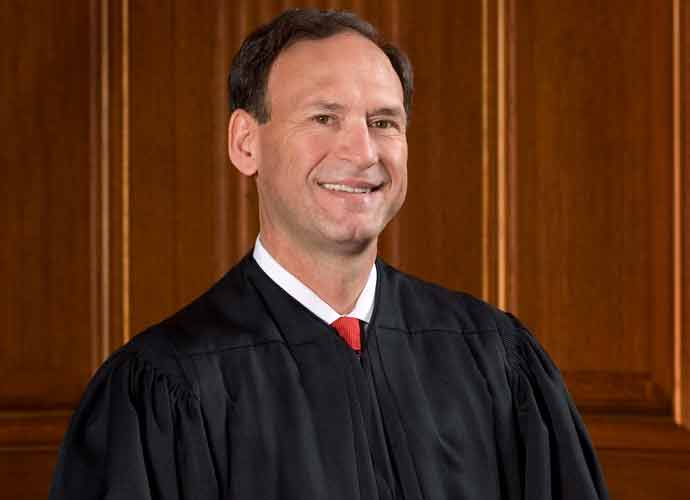Justices Clarence Thomas & Samuel Alito Urge Supreme Court To Overturn Gay Marriage Ruling
Justices Clarence Thomas and Samuel Alito, two of the four justices who dissented from the Supreme Court’s 2015 decision establishing a constitutional right to same-sex marriage, urged the court on Monday to reconsider the monumental 2015 decision.
“By choosing to privilege a novel constitutional right over the religious liberty interests explicitly protected in the First Amendment, and by doing so undemocratically, the court has created a problem that only it can fix,” Justice Thomas wrote, in an opinion joined by Justice Alito.
The two argued that Obergfell v. Hodges posed a threat to religious freedom.
“Due to Obergefell, those with sincerely held religious beliefs concerning marriage will find it increasingly difficult to participate in society,” Justice Thomas wrote.
Subscribe to our free weekly newsletter!
A week of political news in your in-box.
We find the news you need to know, so you don't have to.
He continued: “Obergefell enables courts and governments to brand religious adherents who believe that marriage is between one man and one woman as bigots, making their religious liberty concerns that much easier to dismiss… In other words, Obergefell was read to suggest that being a public official with traditional Christian values was legally tantamount to invidious discrimination toward homosexuals.”
“Since Obergefell parties have continually attempted to label people of good will as bigots merely for refusing to alter their religious beliefs in the wake of prevailing orthodoxy,” he added.
The two justices’ opinion prompted immediate backlash.
James Obergefell, the lead plaintiff in the 2015 case, said the justices’ comments were “deeply disturbing and upsetting.”
“Justices Thomas and Alito seem to imply that freedom of religion carries more weight, is more important, than all other rights,” Obergefell told the New York Times.
“Just a reminder that overturning #Obergefell (gay marriage) is in the Republican Party’s official platform,” Chasten Buttigieg, former Democratic presidential candidate Pete Buttigieg‘s husband wrote. “Alito and Thomas just signaled their wishes to overturn it and we already know where Barrett stands on the issue. Please vote.”
Just a reminder that overturning #Obergefell (gay marriage) is in the Republican Party’s official platform. Alito and Thomas just signaled their wishes to overturn it and we already know where Barrett stands on the issue. Please vote.
— Chasten Glezman Buttigieg (@Chasten) October 5, 2020
California Gov. Gavin Newsom (D) wrote that confirming Supreme Court nominee Amy Coney Barrett would be tantamount to an attack on LGBT rights.
“In 2004 we began marrying same-sex couples in San Francisco. 5 years ago the Supreme Court affirmed that right,” Newsom wrote. “Now, Alito and Thomas just signaled their wishes to overturn it. The [GOP is] coming for marriage equality–and Amy Coney Barrett gives them that opportunity. VOTE.”
In 2004 we began marrying same-sex couples in San Francisco.
5 years ago the Supreme Court affirmed that right.
Now, Alito and Thomas just signaled their wishes to overturn it.
The @GOP are coming for marriage equality–and Amy Coney Barrett gives them that opportunity.
VOTE. https://t.co/4U7g5TVsZ6
— Gavin Newsom (@GavinNewsom) October 6, 2020
James Esseks, a lawyer with the American Civil Liberties Union, told the Times he was appalled by the decision.
“It is appalling that five years after the historic decision in Obergefell, two justices still consider same-sex couples less worthy of marriage than other couples,” Esseks said. “When you do a job on behalf of the government — as an employee or a contractor — there is no license to discriminate or turn people away because they do not meet religious criteria.”
The justices issued their opinion regarding a case brought by Kim Davis, a Kentucky county clerk who had been sued for refusing to issue marriage licenses to same-sex couples. The case was turned down by the court, claiming it did not cleanly present questions warranting review — a conclusion both Alito and Thomas concurred in.
The Obergefell case was decided by a 5-4 vote, with Chief Justice John Roberts and Justice Antonin Scalia dissenting, in addition to Alito and Thomas. Roberts did not join the two justices in their opinion.
The other two conservative justices on the court, Brett Kavanaugh and Neil Gorsuch — who replaced the late Scalia — also did not join the opinion.
However, another conservative appointment to the court would undoubtedly shift the power and probability of rescissions of LGBT rights.
Get the most-revealing celebrity conversations with the uInterview podcast!








Leave a comment